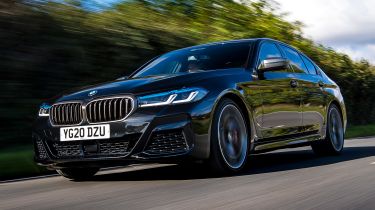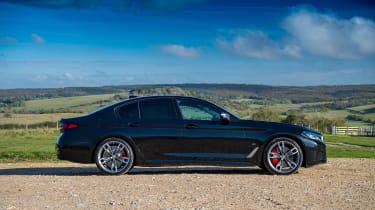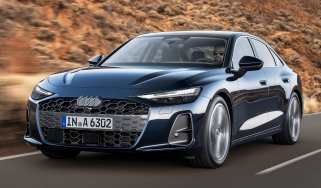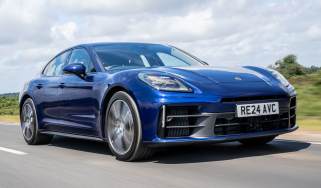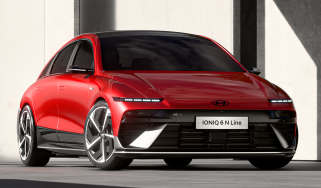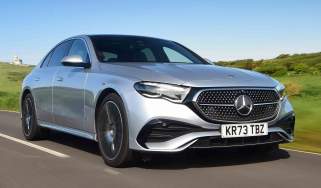BMW 5 Series saloon - MPG, running costs & CO2 (2017-2024)
The latest BMW 5 Series is even more economical than the old one, which is an impressive achievement
Executive expresses like the BMW 5 Series have to perform something of a balancing act: buyers at this end of the market expect low running costs paired with impressive performance, practicality and luxury – and that means powerful engines, big bodies and lots of equipment.
These demands tend to push a car's weight up, which is an enemy of high economy and low emissions. Carmakers must work hard to achieve all this, but the results can be impressive - and the 5 Series is a case in point. Despite being fast, spacious and well appointed, it can return well over 50mpg with a diesel engine – and even more if you pick a plug-in hybrid model. Every four- and six-cylinder engine now gets mild-hybrid technology, recovering energy normally wasted under braking. This helps the cars to be cleaner and reduce running costs for company-car drivers.
BMW 5 Series MPG & CO2
The BMW 520d is a stalwart of the 5 Series range. In standard rear-wheel-drive guise, it returns up to 58.9mpg in SE trim and emits 127-133g/km of CO2 when equipped with rear-wheel drive. Opting for the 520d with xDrive four-wheel drive reduces economy to a best-case claim of 55.4mpg and pushes CO2 emissions up to 133-140g/km. These emissions figures mean company-car buyers will be liable for a middling Benefit-in-Kind (BiK) bill for both models. These are all factors that make the 520d a hit for business and private buyers who spend a lot of time on the motorway, where an electric car can lack range.
More reviews
If you’re happy to trade some fuel economy for some extra performance, the BMW 530d xDrive manages up to 51.4mpg and emits 143-148g/km, putting it into high BiK bandings for business drivers. Be aware that all the 5 Series’ diesel engines use AdBlue to reduce emissions, which high-mileage users may need to top up in between annual services.
The real economy star – on paper at least – is the petrol-electric plug-in hybrid BMW 530e, which officially returns as much as 201.8mpg in SE trim with rear-wheel drive. With the four-wheel drive xDrive model, this figure falls to between 156.9 and 176.6mpg. As with many hybrids, that figure might be tough to match in real-world conditions, and impossible without plugging in frequently to charge, but low CO2 emissions of 31-41g/km mean business users get a significantly lower BiK liability. A faster 545e xDrive PHEV is also offered, which sees fuel economy drop to between 148.7 to 166.2mpg and emissions creep up to 41-51g/km. Plug-in hybrids are no longer efficient enough to escape London’s Congestion Charge, however, so you’ll need an electric car like the BMW i4 or Mercedes EQE if that’s important to you.
If your commute is under around 35 miles, you should be able to get to work in the 530e without using any petrol.
Those hankering for a conventional petrol engine can choose the BMW 520i, which in SE spec returns up to 45.6mpg and emissions of 142-149g/km. Go for the V8-powered BMW M550i xDrive, and predictably you’ll have to trade efficiency for the extra performance, with fuel economy of up to 26.6mpg and CO2 emissions of 243-247g/km.
After the first year’s CO2-based road tax (normally included in the on-the-road price) all versions of the 5 Series, including the petrol, diesel and PHEV models, are liable for the discounted VED rate. The M550i is the exception to this and is taxed at the standard VED rate. All models now cost more than £40,000, so are liable for the additional VED surcharge from years two to six of ownership.
Insurance group
The BMW 520d should be cheapest to cover but considering it starts in group 38 out of 50, you can see that all versions of the 5 Series are relatively expensive to insure. The range-topping M550i xDrive isn't quite in the top band though, falling into group 46.
Servicing
All BMWs require servicing based on on-board indicators that use sensors to determine when maintenance is necessary. To ensure there are no nasty shocks when it comes time to book your 5 Series in for a service, BMW offers servicing packages for its cars. Do investigate these, as they can be real money-savers.
Warranty
BMW’s three-year/unlimited-mileage warranty is reasonable if unexceptional – and identical to the policy that Mercedes provides. Audi provides a 60,000-mile limit to its three-year cover.

